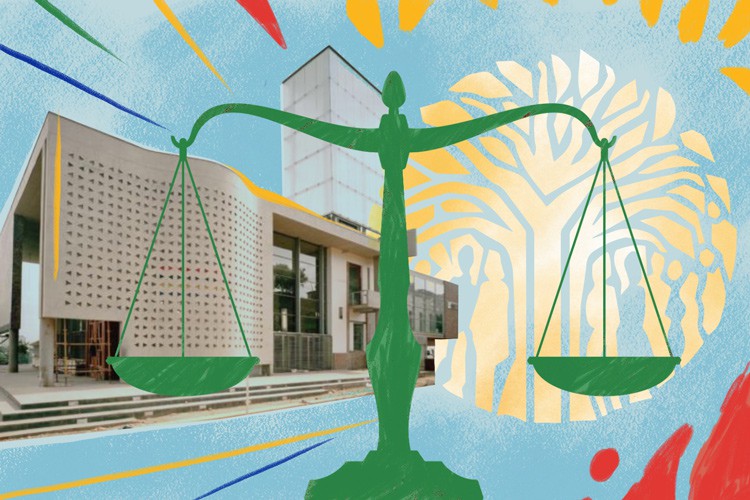
9 September 2022
Illustration: Lisa Nelson
A former student at the University of Cape Town (UCT), wrongly named in a widely-circulated list of “rapists” at the institution, has won his damages claim against the woman who, he claimed, admitted putting his name on it although she did not believe he was a sex offender.
Ramaano Marathi Ramokgopa said he had been ostracised, had stopped attending lectures, had suicidal thoughts, and had subsequently left the university to continue his studies elsewhere.
The list with his name on it was read out at a memorial service for murdered student Uyinene Mrwetyana in September 2019, and was again circulated on the anniversary of her death.
Following the compilation and circulation of the list, UCT management cautioned that it was legally dangerous and urged students to use the institutional processes available to assist victims of sexual gender-based violence.
Western Cape High Court Judge Elizabeth Baartman ruled that Siphelele Lenah Nxumalo must pay Ramokgopa just over R300,000 in damages and medical expenses.
The judge also ordered that Nxumalo must apologise to him in writing and broadcast a “formal written apology” on her social media accounts within 30 days.
Nxumalo did not initially participate in the hearing in spite of proof that the papers were served on her and being given several opportunities to do so.
Judge Baartman said because the matter could deter survivors or victims of gender-based violence from reporting incidents “and so perpetuate these soul-destroying crimes”, it was important to give Nxumalo every opportunity to defend the claim against her.
Judge Baartman said when Nxumalo failed to attend a pre-trial conference, she had postponed the matter again, directing that Ramokgopa’s lawyers make a last attempt to locate her through the university and a tracing agent.
There was still no response.
The judge said when she heard the application in May this year, and after hearing the evidence of Ramokgopa and a psychologist who had been treating him, she had been informed by her registrar that Nxumalo had sent her an email. The email address was the same one that Ramokgopa’s attorneys had used to serve the papers on her.
“It follows that she had notice of the process all along,” Judge Baartman said.
“It was apparent from the correspondence that she was vexed that the proceedings were continuing in her absence. She accused the court of adding to her trauma, presumably because Ramokgopa had, at my direction, gone to great lengths and expense to service notices on her.
“In the exercise of judicial restraint, I postponed the hearing to 14 June.”
The judge said on that day, Nxumalo had a “bad connection and a contemptuous attitude” … that she was only available until 10:30am when she would lose internet connection.
“Despite judicial restraint now being stretched to its limits, I postponed the matter to 16 August. Unsurprisingly she failed to attend on that day but sent email correspondence which came to my attention after the hearing and I had already reserved judgment. I have not had regard to it as I was not inclined to indulge her any further.”
The judge said her ruling did not deal with the appropriateness or otherwise of the publication of the list, but only with the appropriateness of the inclusion of Ramokgopa’s name.
The psychologist, Dr Glada Del Fabbro, had testified that Ramokgopa showed signs of having post-traumatic stress disorder, that he was depressed and suffered from anxiety directly related to the incident.
Ramokgopa, who was 20 at the time, said he was kicked off WhatsApp groups, uninvited to social events, and ostracised.
He said he stopped attending lectures, with one lecturer even thanking him for “being considerate”.
He said Nxumalo had approached him and suggested that they meet for lunch.
“She told me she was the one who put me on the list and said she was sorry. She did not want to do it,” Ramokgopa said.
He said Nxumalo named another woman who had encouraged her to do it and that she did not believe that his name should have been included. She said, however, she could do nothing about it.
Ramokgopa said he left UCT because “there was no life for me there”.
“I was terrified really. I couldn’t be on campus … I would have panic attacks.”
Judge Baartman said Ramokgopa had been a credible witness.
“This court has held that it would be preposterous to give the alleged abuser editorial rights over the victim’s narrative – and speaking out should be encouraged. The difficulty in this matter is that Nxumalo is neither a victim nor a survivor of sexual abuse.”
She said Nxumalo had been reluctant to add his name to the list, had said she did not believe the allegations her friend had made against him, and when she met Ramokgopa, had “attested to his good character”.
The judge said the reaction of fellow students and friends was “appropriate” because sexually deviant behaviour should not be tolerated. However, Ramokgopa had testified that he had never offended in the manner suggested.
“There is nothing to gainsay that version, despite the numerous opportunities afforded to Nxumalo to put her version before the court,” the judge said.
Nxumalo had named him a sex offender when she did not believe it to be true and she made no attempt to ascertain if it was true.
“He has been defamed, his right to dignity infringed and his good name tarnished … There is no doubt this unfortunate incident will continue to haunt him.”
Judge Baartman said while Ramokgopa’s lawyers had asked for R500,000 in damages, in considering the “broader impact and the need to encourage platforms for survivors of sexual abuse to speak out”, she believed a lower amount R80,000 would not affront his injured dignity.
She also ordered that Nxumalo pay R223,000 for past and future medical expenses and to pay his legal costs.